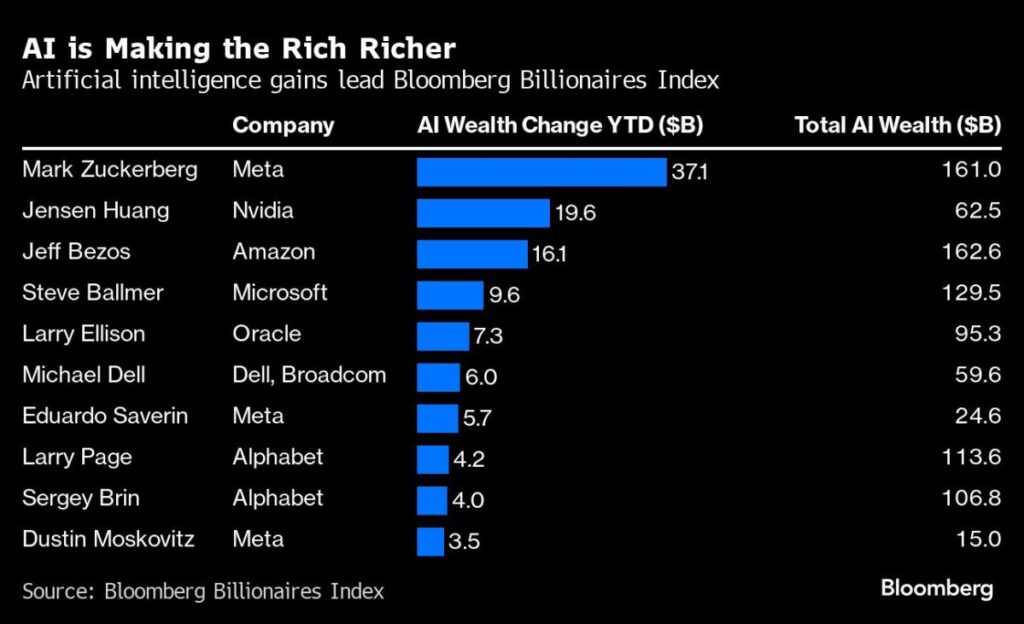AI’s Influence on Wealth: Insights from the World’s Richest

Introduction
As artificial intelligence (AI) continues to permeate various sectors, its impact on the global job market and wealth distribution cannot be understated. With nearly 40 percent of jobs worldwide expected to be affected by AI, there arises a critical need for carefully crafted policies to harness its potential effectively. Notably, among the world’s wealthiest individuals, a significant proportion attribute a substantial portion of their fortunes to companies tracked by the Bloomberg Global Artificial Intelligence Index. The staggering gains witnessed in their net worth, totaling $124 billion this year alone, underscore AI’s pivotal role in driving wealth creation and reshaping economic landscapes.
NVIDIA Corp. (#NASDAQ: $NVDA) overtakes Amazon Inc. $AMZN and Alphabet Inc. $GOOG in market capitalization.
— Klāvs GO Markets (@KlavsGOMarkets) February 12, 2024
NVIDIA's market cap now stands at $1.830T, making it the fourth largest company in the world, according to @CompaniesMarke1.#NVIDIA • #NVDA • #Stocks pic.twitter.com/wJ0vNbQ2pW
Rise of AI in Wealth Generation
As AI technologies continue to advance, their role in wealth accumulation is becoming increasingly prominent. With sophisticated algorithms and machine learning capabilities, AI enables more accurate and data-driven decision-making in investment strategies, leading to enhanced returns and wealth accumulation for investors. Additionally, AI-powered automation streamlines processes, reduces operational costs, and improves productivity, thereby contributing to overall wealth growth.
Moreover, AI technologies are revolutionizing businesses and investments by providing insights into market trends, consumer behavior, and competitive landscapes. Through predictive analytics and personalized recommendations, AI optimizes marketing campaigns, product development, and customer experiences, driving business growth and fostering investor confidence. Furthermore, AI-driven innovations in sectors such as finance, healthcare, and retail are creating new opportunities for businesses to expand their operations and generate wealth in unprecedented ways.
Wealth Trends Among the World's Rich

The surge in fortunes of tech executives like Nvidia Corp.’s Jensen Huang and his cousin Lisa Su of Advanced Micro Devices Inc. As AI-related stocks soar, propelled by the promise of transformative technologies, the market value of companies like Nvidia surpasses even industry giants like Amazon.com Inc. This trend underscores the growing influence of AI in driving economic prosperity, with AI-driven innovations and investments playing a pivotal role in shaping the wealth landscape and minting new billionaires in the tech industry.
Artificial intelligence (AI) is revolutionizing various sectors, driving wealth creation through innovative applications and advancements.
- In the technology sector, AI-powered solutions enhance product development, streamline operations, and optimize user experiences. For example, companies like Google and Apple utilize AI algorithms for voice recognition in virtual assistants like Google Assistant and Siri, driving user engagement and loyalty.
- In finance, AI algorithms analyze vast amounts of data to predict market trends, optimize investment strategies, and mitigate risks. Hedge funds and asset management firms employ AI-driven trading algorithms to make real-time investment decisions, maximizing returns and minimizing losses.
- In healthcare, AI technologies enable personalized treatment plans, medical image analysis, and drug discovery. Companies like IBM Watson Health use AI to analyze patient data and identify personalized treatment options, leading to better healthcare outcomes and reduced costs.
- In real estate, AI-powered tools assist in property valuation, market analysis, and predictive modeling. Platforms like Zillow utilize AI algorithms to analyze housing market data and provide accurate property valuations, empowering buyers and sellers to make informed decisions.
- Overall, AI’s transformative impact across sectors like technology, finance, healthcare, and real estate underscores its role in driving wealth creation and shaping the future of industries worldwide. As evidenced by the substantial gains in net worth attributed to AI-related companies, the proliferation of AI technologies continues to drive economic prosperity and create new opportunities for wealth accumulation.
Opportunities and Challenges
AI presents entrepreneurs and investors with a myriad of opportunities to generate wealth. Firstly, AI-driven technologies enable businesses to enhance operational efficiency, optimize processes, and improve productivity, leading to cost savings and increased profitability. Additionally, AI-powered analytics provide valuable insights into consumer behavior, market trends, and competitive landscapes, empowering entrepreneurs to make data-driven decisions and capitalize on emerging opportunities. Moreover, AI facilitates the development of innovative products and services, opening up new markets and revenue streams for entrepreneurs to explore. Overall, AI offers entrepreneurs and investors the potential to drive growth, innovation, and wealth creation across various industries.
However, AI-driven wealth accumulation also poses significant challenges and ethical considerations. One major concern is job displacement, as automation and AI technologies replace traditional roles and tasks, leading to unemployment and income loss for workers. This exacerbates income inequality and socio-economic disparities, particularly for marginalized communities lacking access to education and training in AI-related fields. Moreover, ethical considerations arise regarding data privacy, algorithmic bias, and AI-powered decision-making, raising concerns about fairness, accountability, and transparency in AI-driven wealth accumulation. To address these challenges, policymakers, businesses, and society as a whole must prioritize inclusive and ethical AI deployment, invest in reskilling and upskilling programs for affected workers, and establish regulations and guidelines to ensure responsible AI development and use. By addressing these challenges proactively, we can harness the full potential of AI to drive equitable and sustainable wealth generation for all.
Conclusion
With AI-related companies significantly boosting the net worth of the world’s wealthiest individuals. This underscores the transformative power of AI in driving economic prosperity and reshaping the wealth landscape. As AI continues to advance, understanding its role in wealth creation becomes increasingly crucial for entrepreneurs, investors, and policymakers alike. By harnessing AI-driven technologies and innovations, we can unlock new opportunities for growth, innovation, and wealth creation, ensuring a more prosperous and equitable future for all.
AI’s impact on global employment is profound, touching nearly 40% of jobs, replacing some while complementing others. Effective policy measures are imperative to harness its potential fully. Achieving a delicate equilibrium in policy-making is paramount as AI continues to revolutionize the workforce. Only through thoughtful and strategic approaches can we unlock AI’s transformative power while mitigating its disruptive effects on employment.





